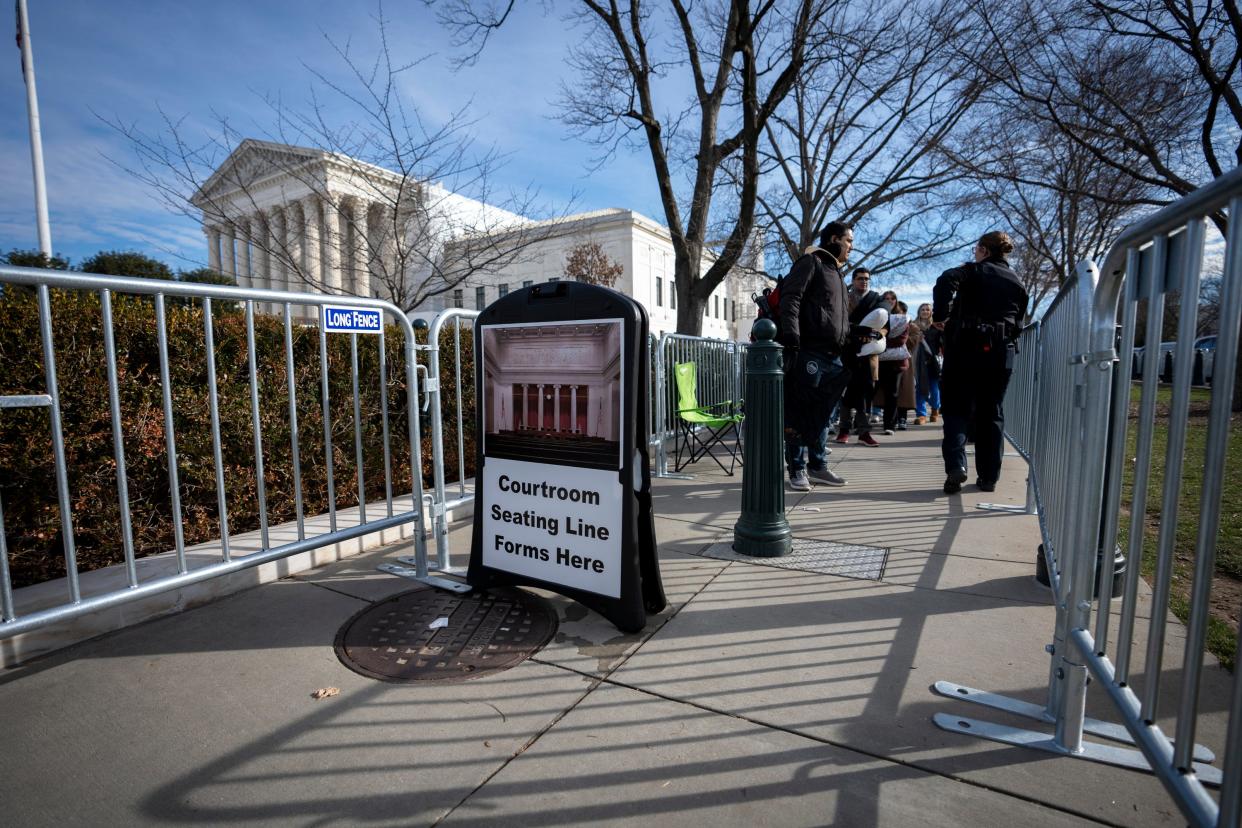10 quotes and exchanges to know from Trump's Supreme Court hearing on 14th Amendment

- Oops!Something went wrong.Please try again later.
The Supreme Court heard arguments in a lawsuit that could see former President Donald Trump removed from the ballot in Colorado Thursday.
The case centers around the ability of the state to enforce the disqualification clause of the 14th Amendment. Colorado District Court Judge Sarah B. Wallace found that Trump had committed insurrection, but the provision in the 14th Amendment that would disqualify a candidate did not apply to presidents. The Colorado State Supreme Court later reversed the ruling and banned Trump from the ballot, leading to the appeal to the Supreme Court heard.
"The Court further concludes that the events on and around January 6, 2021, easily satisfy this definition of 'insurrection,'" Judge Wallace wrote in her November decision.
Section three of the post-Civil War amendment says, "No person shall...hold any office, civil or military, under the United States, or under any State, who, having previously taken an oath, as a member of Congress, or as an officer of the United States...to support the Constitution of the United States, shall have engaged in insurrection or rebellion against the same, or given aid or comfort to the enemies thereof.
The case could serve as precedent for similar rulings, including the decision of the Maine Secretary of State that Trump is ineligible to run. The justices could rule quickly to avoid conflict on Super Tuesday, March 5, when Colorado, Maine and 13 other states hold primaries, the Associated Press reported.
Here are some of the key exchanges from Thursday's oral arguments:
Disqualification, remedy causes contention
"We don't know whether President Trump will be excused before he's sworn in, if he wins the election, on January 20th, 2025. And a -- and a court that is saying that President Trump has to show now, today, that he would qualify under Section 3 is accelerating the deadline that the Constitution provides for him to obtain a waiver from Congress," Jonathan Mitchell, lawyer for Donald Trump
Should the court disqualify Trump from holding office, a vote by two thirds of both chambers of Congress would be able to override the decision. The text of the amendment does not establish a deadline for Congress to take such a vote.
"This disability (disqualification) can be removed, right, under Section 3. That's what's different about it. So, thoughts on that?" Justice Neil Gorsuch
"Well, the fact that there's an extraordinary provision for removing the disability does not negate the fact that the disability exists today and it's existed since January 6th, 2021 when President Trump engaged in insurrection against the Constitution," Jason Murray, lawyer for the respondents
"The Constitution doesn’t require that he (Trump) be given another chance," Murray
Constitutional, judicial history haunt proceedings
"Is there anything in the original drafting, history, discussion that you think illuminates why that distinction (between office and officer) would carry such profound weight?" Justice Gorsuch.
"Not of which we're aware," Mitchell
One of the arguments representatives for Trump have made is that the President holds an office but is not an officer of the United States and therefore is not covered under the 14th Amendment. Justice Gorsuch has branded himself as "textualist," a judicial philosophy that interprets law using the plain meaning of the statue without considering history or intent.
"The whole point of the 14th Amendment was to restrict state power, right? ... So wouldn't that be the last place that you'd look for authorization for the states, including Confederate states, to enforce -- implicitly authorized to enforce the presidential election process? That -- that seems to be a position that is at -- at war with the whole thrust of the 14th Amendment," Chief Justice Roberts
The Chief Justice has previously devolved election authority to the states in overturning portions of the Voting Rights Act in Shelby Counter v. Holder in 2013. The decision ended the "pre-clearance" provision of the act, which required nine states to submit to the federal government any laws that changed election procedures before implementing them. North Carolina implemented voter identification laws in the wake of the decision.
National effects rooted in state decision
"Federalism creates redundancy. And here the fact that states have the ability to enforce it as well, absent federal preemption, provides an additional layer of safeguards around what really Section 3 supports," Murray
A question that appeared multiple times in the arguments was the ability for states to enforce the disqualification provision of the 14th Amendment.
"The fact that someone's complaining not about the bottom-line conclusion but about the very processes that were used in the state would seem to -- and that that would be permitted, seems to underscore the concerns that have been raised about state power," Justice Brett Kavanaugh
"If we affirmed and we said he was ineligible to be president, yes, maybe some states would say well, you know, we're going to keep him on the ballot anyway but, I mean, really it's going to have, as Justice Kagan said, the effect of Colorado deciding," Justice Amy Coney Barrett
"Colorado is not deciding who other states get to vote for president. It's deciding how to assign its own electors under its Article II power. And the Constitution grants them that broad power," Murray
The Constitution grants states the ability to appoint electors to the Electoral Congress to select the President.
"I guess in my view of the history, I'm wondering, really, whether presidential elections were such a circumstance, that the Framers actually envisioned states enforcing Section 3 with respect to presidential elections as opposed to senatorial elections, representatives, the sort of more local concerns," Justice Ketanji Brown Jackson
This article originally appeared on USA TODAY: Quotes from Trump Supreme Court arguments on Colorado ballot issue

